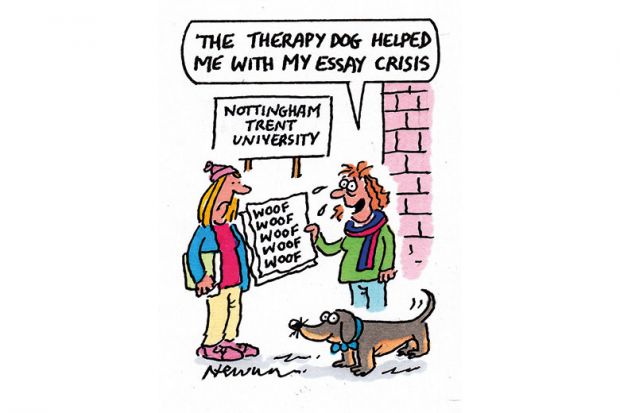
Universities deploying therapy dogs to bring down stress levels among students is old news. But the Daily Mail saw Nottingham Trent University’s Jimmy Chipolata (a sausage dog) as a significant development, for he is “believed to be the UK’s first in-house university therapy dog, providing psychological support – and snuggles – for undergraduates in times of stress”, it reported on 27 February. Jimmy’s owner, Debra Easter, head of service, student employability at Nottingham Trent, confirmed that he is not “on the payroll”, although other reports suggest he is paid in cheese. Nottingham Trent may have to answer a difficult question: what point on higher education’s national pay spine equates to large quantities of cheese?
When the University of California, Berkeley cancelled a speech by far-right provocateur Milo Yiannopoulos in 2017, Donald Trump appeared to suggest he could take away the institution’s federal funding. “If U.C. Berkeley does not allow free speech and practices violence on innocent people with a different point of view – NO FEDERAL FUNDS?” he barked on Twitter. Broadening this attack, he has now vowed to “soon” issue an executive order that would deny federal research funds to colleges and universities that do not support free speech, Inside Higher Ed reported on 4 March. “If they want our dollars and we give them by the billions, they’ve got to allow people to speak,” Mr Trump said in a speech at the Conservative Political Action Conference. But, Inside Higher Ed noted, the president “did not describe how the executive order would work, or who would judge whether a college or university was not protecting free speech” – which sounds about right for comments less about policy, more about enraging and energising his base using one of the biggest “hot button” issues on the right.
There have been growing concerns over Australian universities’ financial exposure to students from overseas – particularly the key market of China. But in a forthright defence at the National Press Club, Universities Australia chair Margaret Gardner said that they should not have to apologise for being “one of the most successful sectors in the world”, it was reported on 27 February. “Go and talk to any other export industry and put it to them…a tiny little country, about to move from third in the world to second. We should be wringing our hands and tearing our hair out? No. We should be celebrating that success,” the Monash University vice-chancellor said in a speech to the National Press Club. All very interesting for universities in the UK, presumably the soon-to-be-number-three referred to by Professor Gardner.
No such problems with overseas recruitment at Oxbridge, however – where growth in non-EU student numbers goes alongside shrinkage in UK numbers. “There are more than a thousand fewer UK undergraduate students at Oxford and Cambridge universities than a decade ago,” the BBC News website reported on 26 February. The BBC cited Higher Education Statistics Agency figures that showed a 7 per cent fall in UK undergraduate numbers at Oxford and 5 per cent at Cambridge. “Overseas undergraduate students rose by 51 per cent at Oxford and 65 per cent at Cambridge,” it added. But a spokeswoman for Oxford said that its overseas student intake had not been influenced by “the fees they may bring with them”. Oxford and Cambridge have long resisted calls to expand their UK intake – which they say is prohibitively costly and which cynics might say would reduce the scarcity, or snob value, of their degrees. We are often told that this is an age in which populists are challenging the authority of wealthy, out-of-touch elites – odd, then, that none of this has touched Oxbridge.
Money launderers have seen an opportunity in some of the Chinese students in the UK, it seems. “Dozens of Barclays bank accounts belonging mainly to Chinese students at UK universities have been frozen over fears they have been used by criminals to launder millions of pounds,” the Financial Times reported on 28 February. “UK law enforcement bodies applied to courts around the country in a co-ordinated operation on Thursday to freeze 95 accounts containing an estimated £3.6m of suspicious funds.” In some cases, money was “cleaned” by being used to buy luxury goods that were then sent back to China.
Register to continue
Why register?
- Registration is free and only takes a moment
- Once registered, you can read 3 articles a month
- Sign up for our newsletter
Subscribe
Or subscribe for unlimited access to:
- Unlimited access to news, views, insights & reviews
- Digital editions
- Digital access to THE’s university and college rankings analysis
Already registered or a current subscriber? Login







